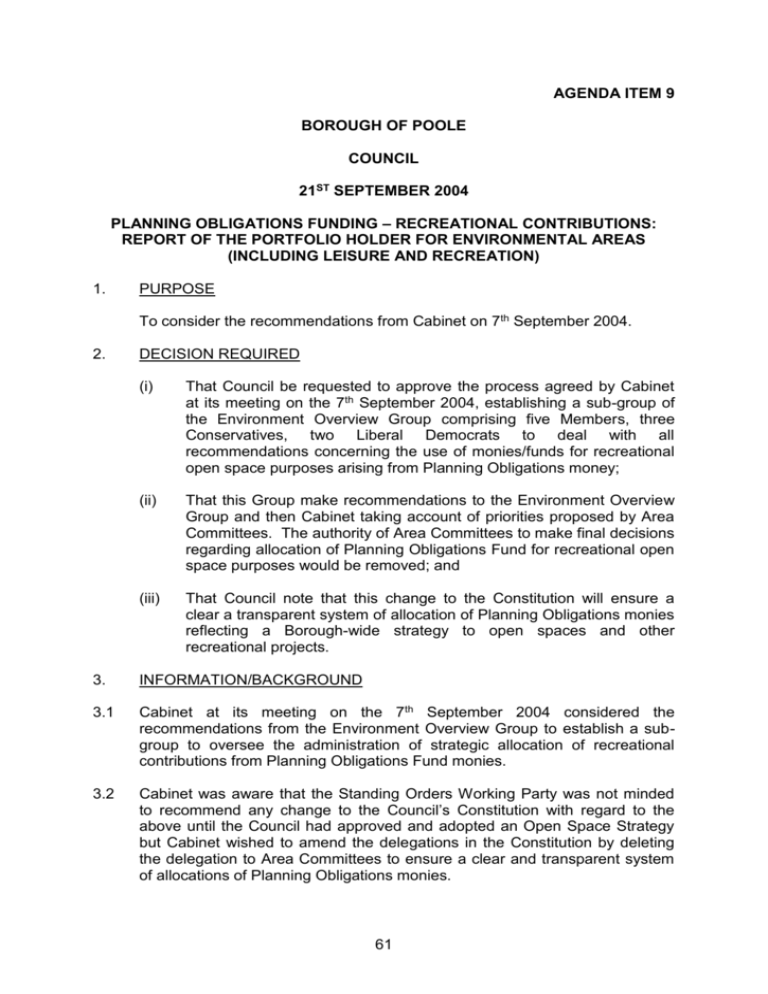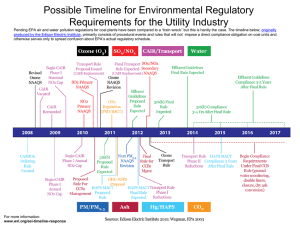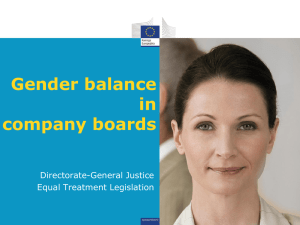planning obligations funding – recreational contributions
advertisement

AGENDA ITEM 9 BOROUGH OF POOLE COUNCIL 21ST SEPTEMBER 2004 PLANNING OBLIGATIONS FUNDING – RECREATIONAL CONTRIBUTIONS: REPORT OF THE PORTFOLIO HOLDER FOR ENVIRONMENTAL AREAS (INCLUDING LEISURE AND RECREATION) 1. PURPOSE To consider the recommendations from Cabinet on 7th September 2004. 2. DECISION REQUIRED (i) That Council be requested to approve the process agreed by Cabinet at its meeting on the 7th September 2004, establishing a sub-group of the Environment Overview Group comprising five Members, three Conservatives, two Liberal Democrats to deal with all recommendations concerning the use of monies/funds for recreational open space purposes arising from Planning Obligations money; (ii) That this Group make recommendations to the Environment Overview Group and then Cabinet taking account of priorities proposed by Area Committees. The authority of Area Committees to make final decisions regarding allocation of Planning Obligations Fund for recreational open space purposes would be removed; and (iii) That Council note that this change to the Constitution will ensure a clear a transparent system of allocation of Planning Obligations monies reflecting a Borough-wide strategy to open spaces and other recreational projects. 3. INFORMATION/BACKGROUND 3.1 Cabinet at its meeting on the 7th September 2004 considered the recommendations from the Environment Overview Group to establish a subgroup to oversee the administration of strategic allocation of recreational contributions from Planning Obligations Fund monies. 3.2 Cabinet was aware that the Standing Orders Working Party was not minded to recommend any change to the Council’s Constitution with regard to the above until the Council had approved and adopted an Open Space Strategy but Cabinet wished to amend the delegations in the Constitution by deleting the delegation to Area Committees to ensure a clear and transparent system of allocations of Planning Obligations monies. 61 3.3 The Report to the Environment Overview Group is enclosed for Members’ information. Councillor Don Collier Portfolio Holder for Environmental Areas (including Leisure and Recreation) 62 COUNCIL – FOR INFORMATION – 21 SEPTEMBER 2004 BOROUGH OF POOLE ENVIRONMENT OVERVIEW GROUP 8th July 2004 REPORT OF THE HEAD OF LEISURE PLANNING OBLIGATIONS FUNDING – RECREATIONAL CONTRIBUTIONS 1. Purpose of Report 1.1 To provide Members with feedback from the work of the Planning Obligations Working Group 1.2 To make recommendations in relation to the way forward for allocating recreational contributions from the planning obligations system. 2. Recommendations 2.1 Members are requested to: 2.1.1 note the issues relating to the current system for allocating planning obligations and the emerging priorities from the Open Spaces Strategy. 2.1.2 consider recommending to Cabinet the creation of a sub-group of the Environment Overview Group to oversee the administration and strategic allocation of recreational contributions from planning obligations, as set out in paragraphs 5.3 and 5.4 3. Background 3.1 Following the meeting of the Environment Overview Group, on 9 th October 2003, a working group was set up to consider how the allocation and spending of planning obligations funds for recreational purposes could be improved. This followed concerns raised by Members that funds were not being spent quickly enough, and that if this situation could not be improved it might be possible for contributions from developers to be claimed back in the future. The collection that has caused most concern is the Casual Play and Amenity Open Space fund as this currently shows the largest balance, at £855,918 unallocated. 63 3.2 The reasons why the Casual Play and Amenity Open Space fund has proved difficult to spend include the following: Staff resources are insufficient to take forward more than a small number of projects at any one time. Where projects being progressed are relatively small in financial terms, this work can have very little impact on the overall spend from the fund, but may be demanding on staff time Funds are accumulating, often at a faster rate than they can be allocated to projects. Funds are collected from residential developments and accumulated according to the Ward’s where developments have taken place. This means that contributions are made for the general purpose of providing for the ‘additional need for recreational facilities generated by the development’, but this is not necessarily translated into specific and identifiable improvements on sites in the Borough. 3.3 The Planning Obligations Working Group has worked with officers from Leisure Services and Strategic Planning to identify a way forward that would enable swifter progress in developing and delivering projects, whilst at the same time developing a robust and transparent system that would withstand scrutiny in the future. It is considered that the most important outcome should be to create a more direct link between a developer’s contribution and a beneficiary site/project. 3.4 It is important to ensure that the allocation of planning obligations funding is carried out in such a manner as to be consistent with the aims and objectives of the Open Spaces Strategy (currently draft) and other strategy or policy relating to Leisure . IN relation to open spaces the Open Spaces Strategy highlights the need ‘to provide sufficient open space, of the right type and quality, where it is needed, that meets the existing and future needs of residents and visitors for active sport, recreation, nature conservation, cultural activities, community and social development’. The way in which planning obligations is allocated is a key way in which the Council can attempt to meet this objective, so strategic decision making is considered to be a very important aim of any changes to the allocation of planning obligations. 4. Links with the Open Spaces Strategy 4.1 The Open Spaces Strategy considers open space in a strategic manner, identifying a range of sites that can cater for different needs. This means that some sites may be strategic priorities whilst others may be more of a local priority. In other words they may both be priorities but for different reasons. Planning obligations funds must not be used in an indiscriminate fashion in order to deal with these priorities, rather a clear link must be established between collection and spend. The current system uses the Ward boundaries as catchments when in reality these boundaries may not reflect the ways in which people use the Borough’s open spaces. The Open Spaces Strategy provides a more robust link between collection and spend through the creation 64 of more objective catchment areas which are located around priority sites. These catchments do not necessarily relate to Ward boundaries. 4.1.1 As part of the Open Spaces Strategy and as an essential component of a robust planning obligations system it is necessary to compile a list of priorities that justify the collection of funds from developers. Collections are then made in order to deliver these priorities. This work is underway and will ensure a plan lead rather than a reactive system which creates clarity for all interested parties, and focuses the time and efforts of officers. Consideration is also being given to ensuring both formal and semi-natural sites can benefit from planning obligations in such a way as to ensure allocations can withstand scrutiny. As a result it is anticipated that a change to Supplementary Planning Guidance (SPG) will be necessary. 5. The Proposals 5.1 The subject of planning obligations is a complex one with various collections for various purposes. The working group considered that the identifcation of a clear and transparent system based on strategy was paramount, and that in achieving this reference must be made to existing strategies and policy and any necessary changes to SPG must be made. 5.2.1 The development of an Open Spaces Strategy and its accompanying map highlighting both strategic and local priorities means that a change in the formal decision making process for planning obligations is advisable. With equipped play and Amenity open spaces/casual play collections the current system involves Area Committee’s making the formal decisions regarding allocations to projects. The creates valuable input at a local level but may not ensure that the Council’s overall strategy is being delivered. Where collections are made in respect of open space catchment areas that may not reflect Area Committee boundaries it will be important to establish a decision making process that can cope with this situation. 5.3 It is considered that a central decision making group could respond to the priorities being proposed through the Area Committee process, but ultimately make recommendations in relation to planning obligations that reflect a Borough wide strategy to Open Spaces and other recreational projects. This central focus for the allocation and administration of planning obligations based on clear and agreed strategy will result in a more robust and transparent system, and one that will reduce the likelihood of challenges to the system from developers, and speed up the delivery of work on the ground. This would also overcome the potential differences between Area Committee boundaries and open space catchment areas. 5.4 The creation of a sub-group as proposed would deal with all recreational contributions funds derived from the planning obligations system, and make recommendations to the Environment Overview Group and Cabinet. This change would necessitate a change to the Council’s constitution. This new approach would replace the fragmented approach currently operating where some funds require Area Committee approval whilst others are referred direct 65 to Cabinet, without necessarily receiving prior consideration by Members elsewhere. CLIVE SMITH HEAD OF LEISURE Contact: Matti Raudsepp, Open Spaces Manager, 01202-261377 Background Papers: Environment Overview Group, 9th October 2003 66








